Monday, May 18, 2009, 14:40 - Commentary, Photo of the Day
It wouldn’t be Monday if we didn’t get back to reality, as unappealing as it is. The reality is that Europe’s brightest economic stars of the past decade are also those who are hurting the most, as we learn from the Economist.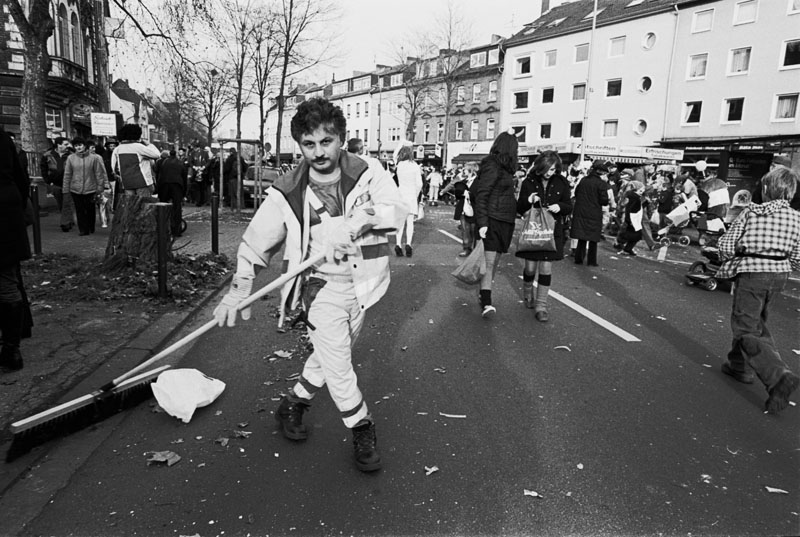
Clean up needed! Cologne 2007 © Damaso Reyes
“The huge signs are up in town squares, city parks and myriad spots where men in overalls dig holes, lay pavements or spruce up public facilities. They proclaim that the work is being paid for by Plan E, the stimulus package pushed through by Spain’s Socialist prime minister, José Luis Rodríguez Zapatero. This included €8 billion ($11 billion) for immediate spending by town halls. “
“Plan E was meant to keep Spaniards working. Yet the latest unemployment figures show that it is not enough. In April 40,000 more people joined the dole queues. That was a slower rise than in previous months, but it still leaves Spain with a 17.4% unemployment rate, the highest in the European Union and twice the EU average. The European Commission predicts that unemployment will hit 20.5% next year. It also says Spain will struggle longer than other countries to recover, getting into positive growth only in 2011, a full year after the EU as a whole. “The sick man of Europe” was how the pro-government El País newspaper greeted the news.”
Times are tough all over, but especially in Spain where much of the growth was fueled by construction and booming real estate prices (sound familiar?). With unemployment surging towards 20% this current crisis is a real test of the European social welfare model not just in Spain but in other European economies as well. Interestingly we are also seeing a reverse migration as immigrants are having an increasingly difficult time finding good paying jobs.
| 0 trackbacks
| 



 ( 3 / 2154 )
( 3 / 2154 )




 ( 3 / 2154 )
( 3 / 2154 )
Thursday, May 14, 2009, 14:08 - Commentary, Photo of the Day
We can joke that the European Union is nothing more than geography surrounded by bureaucracy but those arcane regulations which spring forth from Brussels by the thousands actually do have an impact on the lives of ordinary people, as the Washington Post explains.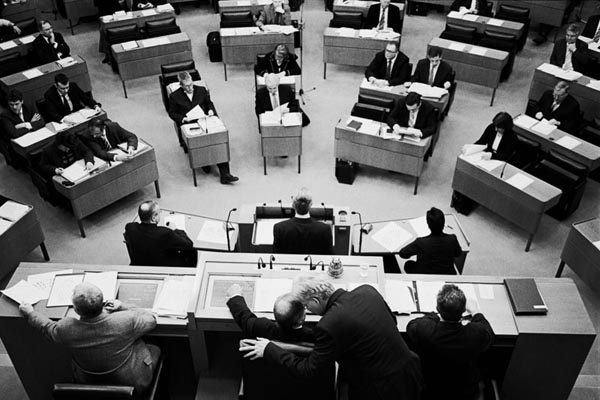
Just fix it. Stuttgart 2007. © Damaso Reyes
“To the buttoned-down European Union bureaucrats in Brussels, the idea was simple: squeeze costs, conquer new markets, maximize profits. But to the vintners of Taradeau, a sun-splashed Provencal village 800 miles to the south -- and a world away, mentally -- it was an attack on their Mediterranean heritage, a crack in French civilization, a fraud against wine lovers everywhere.
“Never, they cried, can you mix a bucket of red wine into a barrel of white and call it rosé. Only the age-old process in which grape skins macerate in the juice for a finely calculated moment before fermentation, they protested, can produce the seductive color, fruity aromas and delicate structure of a true rosé. Mixing red and white, they sniffed, may make something pink to drink, but it is not rosé wine.”
If this new regulation is adopted it will surely impact those French farmers who up until now have had a monopoly on the Rosé brand. I am sure the framers of this new law never imagines the backlash which would occur but I am sure they also never held a public meeting about the new regulation or even spoke to a farmer about it. This is a clear example of just how far the European Union has to go before it is truly accepted by its people. When citizen only interact with government because of something they dislike there is a serious problem there. There needs to be a sea change in how the people in Brussels deal with those which they are charged with serving. Until then, the E.U. will always be “them” and never “us.”
Tuesday, May 12, 2009, 11:58 - Commentary, Photo of the Day
It’s time for a something a little lighter and our friends at The Local.se are more than willing to help out!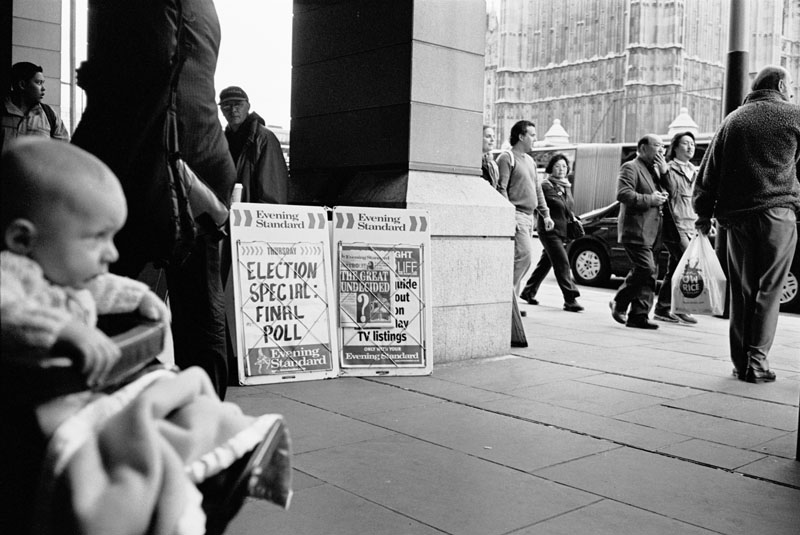
You can call me whatever you want… London 2005
“A Swedish couple from Åre in northern Sweden have taken their fight to name their son Q to the Supreme Administrative Court (Regeringsrätten).
“The court will rule if current legislation permits the use of a single letter as a first name.
“The parents insist that the boy was not named after the popular figure from the James Bond films and that the decision was instead a last minute one when "Q" was born.”
For me this is one of the silliest regulations that many Europeans have to put up with. Perhaps it is my American individuality rearing its ugly head but I believe parents should have the right to name their child whatever they want whether it’s Q or Moon Unit. Why should the State care what I name my child and who other than the parents should have a say in what a child is named? This is one law I think that Europeans can live without…
Monday, May 11, 2009, 12:48 - Commentary, Photo of the Day
If you’ve ever spent some time in France you understand that they know how to live. Two hour lunches, great food and wine, even their trains are chic. Well it seems that French philosophy on life is even helping them weather the current global economic crisis, as we learn from The Economist.\
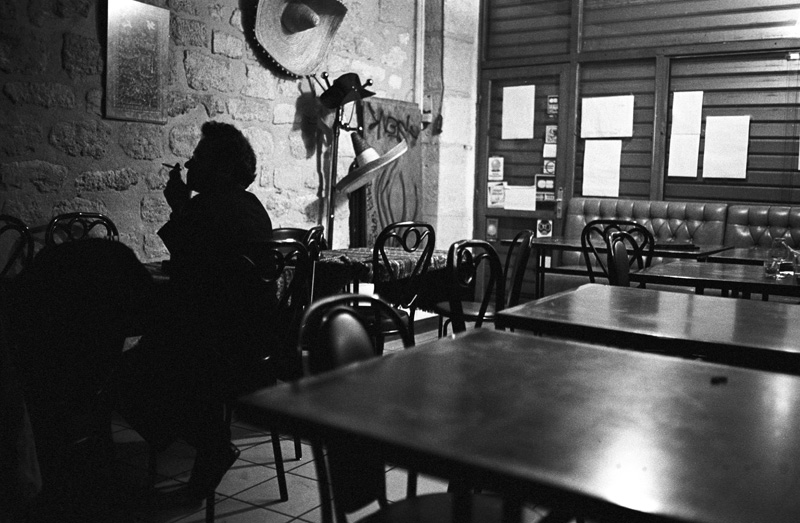
What, me worry? Paris 2007 © Damaso Reyes
“Over 60 metres (nearly 200 feet) above the ground in the Picardy town of Beauvais, fiscal stimulus à la française is under way. With tiny paintbrushes and sandblasters, artisans perched on scaffolding are painstakingly scraping away at the damaged façade of the towering 14th-century gothic cathedral. The €2m ($2.7m) restoration is one of 1,000 projects put in place by the French government as part of its €26 billion stimulus plan. Along with more conventional schemes, such as upgrades to motorways, ports and the TGV high-speed train network, France’s boost includes the scrubbing up of a host of its historic cathedrals and churches.
“Even in a crisis, the French do things differently. Despite calls from the Americans to do more to lift consumer demand, their stimulus plan relies heavily on front-loading investment in infrastructure, cathedrals included, in line with their dirigiste tradition. A strong beneficent state, with heavy taxation, regulation and protection, is common to many continental European countries. But nowhere is it more pronounced or entrenched than in France, where it reaches back to the construction of roads, canals and industrial mammoths under Jean-Baptiste Colbert, Louis XIV’s minister of finance and industry.”
I have to say that from my perch in New York, with its shuttered shops, the French model is looking increasingly attractive. There is something to the safety net many western Europeans have, even when you’re out of work one has the feeling that the state is looking out for you. Here, that feeling just doesn’t exist. Of course there is also more of a focus on living and not working that makes life more pleasant, if not productive in la belle France. Time will tell how soft of a landing France will have compared to its neighbors and for how long it can continue to subsidize this nice feeling…
Friday, May 8, 2009, 13:37 - Commentary, Photo of the Day
“The rich get richer.” Just because it’s a cliché does mean it isn’t true, as we learn in an article from the always informative E.U. Observer.
Running roughshod. Stuttgart 2007. © Damaso Reyes
“Royal landowners and multinational companies were among the biggest beneficiaries of the EU's €55 billion farm aid budget in 2008, a new EU transparency law has shown.
“In France, which alone scooped €10.4 billion of the pot, the Doux Group, which sells chicken products to over 130 countries worldwide, was the biggest single recipient on €62 million.
“Major food companies Nestle and Tate & Lyle were the largest UK winners on around €1 million each.
“British aristocrats, who command significant personal fortunes, also pocketed sizeable amounts of EU cash. The Queen received around €530,000. The Duke of Westminster got €540,000. Prince Charles took €180,000.”
Just like in America, agricultural subsidies are in great need of reform. That doesn’t mean it’s going to happen anytime soon. The artificially low prices for many European commodities, wine is just one example, is a direct result of subsidies originally meant to help small producers but have been co-opted by the rich and multinational corporations. Ultimately these subsidies now end up hurting the proverbial “family farm” since they support their arch rivals: the industrial farm. There must be a better way of persevering a way of life than throwing good money after bad…
Thursday, May 7, 2009, 10:30 - Commentary, Photo of the Day
It seems like pirates are just in the news everywhere these days! In Sweden, the Pirate Party, born out of the fight over file sharing, seems poised to capture a seat in the European Union Parliament as we learn from Gizmodo.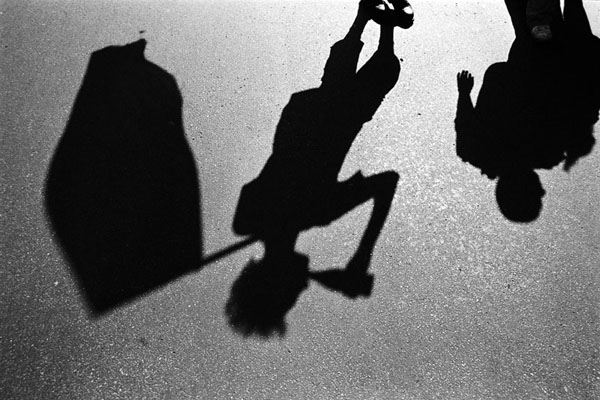
Raise high the banner! Berlin 2007 © Damaso Reyes
“The Pirate Party is now the second-most popular party for voters 18-30, and Swedish newspaper DN.se predicts a vote of 5.1% in the election, which will be enough for a seat in Parliament. Sure, it's a minority vote (and that's being generous), but a pirate can surely stand his ground.”
One of the (few) nice things about parliamentary democracy is the fact that minority parties can more easily achieve representation and even impact on legislation. Sure more E.U. citizens don’t give a fig about the European Parliament but it is a body that has more power than most people think to influence their lives. It’s great that the Pirate Party has matured to the point where they can have their voices heard in the highest halls of Europe.
Tuesday, May 5, 2009, 10:24 - Commentary, Photo of the Day
One of the things that I love about Europe is that no matter how intermixed its cultures become there will always be noticeable regional differences. Take the British and the Germans for example. A friend of mine who lived in Germany for many years once joked that if the government there declared that everyone should wear purple pants the next day at least half of the population would comply. Not so with the British who take every government decree with a healthy, and sometimes not so healthy, dose of skepticism as we learn from the New York Times.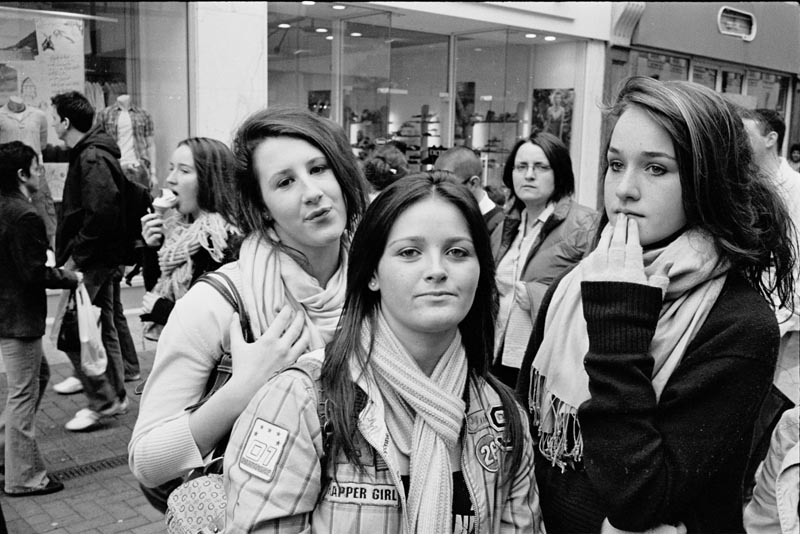
Wot? London 2005
“Mr. Wright says that in the last two months he has sold 3,000 of the 100-watt bulbs — the traditional mainstay of British light fixtures — more than 30 times the usual. People are buying 10 at a time, the limit per customer, even though their price is nearly 50 percent higher than it was a year ago.
“Mr. Wright’s store is on the front lines of resistance to controversial global efforts to end the era of energy-gobbling incandescent light bulbs by phasing out their sale to encourage (or in Mr. Wright’s view, force) people to turn to more efficient compact fluorescents.”
Challenging the authority of government is perhaps the first right of every citizen, and given the sheer number and stupidity of most laws it is clearly not a right we exercise enough. But in this case it is more about traditions dying hard. There is no surely way of creating a desire for something than to ban it and this is what the British has done. Personally in the case of incandescent light bulbs I am in favor of taxation. If you really want the warm glow of one then you should be prepared to pay the true environmental cost. If you make them ten or twenty times as expensive as other lighting choices then most people will come to the conclusion that the warm glow isn’t worth it and those who persist can still have what they want while paying their fair share. Something tells me that the Brits won’t bother with this level of sophistication and will continue apace on the course they have set for themselves.
Monday, May 4, 2009, 10:15 - Commentary, Photo of the Day
“Us and them.” It is often what the world breaks down to. “Them” is always an abstraction, never a reality and rarely nuanced. One of the great things about traveling and living abroad is that it brings you face to face with “them” and if you aren’t careful you might even become one of them. In a great article in the New York Times Magazine Russel Shorto talks about his experience in Holland and how he grew to admire, if not love, the social welfare state.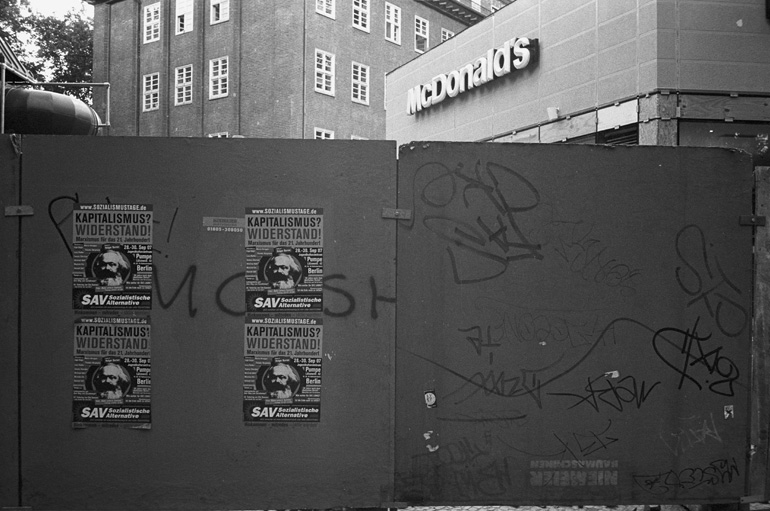
Burning down the house. Berlin 2007. © Damaso Reyes
“Logging into my bank account, I noted with fleeting but pleasant confusion the arrival of two mysterious payments of 316 euros (about $410) each. The remarks line said “accommodation schoolbooks.” My confusion was not total. On looking at the payor — the Sociale Verzekeringsbank, or Social Insurance Bank — I nodded with sage if partial understanding. Our paths had crossed several times before. I have two daughters, you see. Every quarter, the SVB quietly drops $665 into my account with the one-word explanation kinderbijslag, or child benefit. As the SVB’s Web site cheerily informed me when I went there in bewilderment after the first deposit: “Babies are expensive. Nappies, clothes, the pram . . . all these things cost money. The Dutch government provides for child benefit to help you with the costs of bringing up your child.” Any parents living in the country receive quarterly payments until their children turn 18. And thanks to a recently passed law, the state now gives parents a hand in paying for school materials.”
I’ve often said that we Americans have as much to learn from Europe and they do from us and this is very much true when it comes to what they call the social welfare state. A society which is slightly more geared towards the common good is not a bad thing. In fact the United States has been heading in this direction for quite some time. Having spent a good deal of time in Europe these benefits and the higher taxes that come with them don’t seem to impede personal liberty. No, that comes more from social norms and attitudes than anything else. But having that safety net, and the freedom that comes with it, is very valuable indeed. Freedom from fear is indeed the very first freedom citizens from every nation should come to expect.
Friday, May 1, 2009, 11:10 - Commentary, Photo of the Day
Happy May Day! At least happy for some of us, not so happy for others caught in this global economic crisis, which turns out to be most of us. Spain, once one of Europe’s fastest growing economies now risks getting caught in a cycle of deflation, as we learn from the New York Times.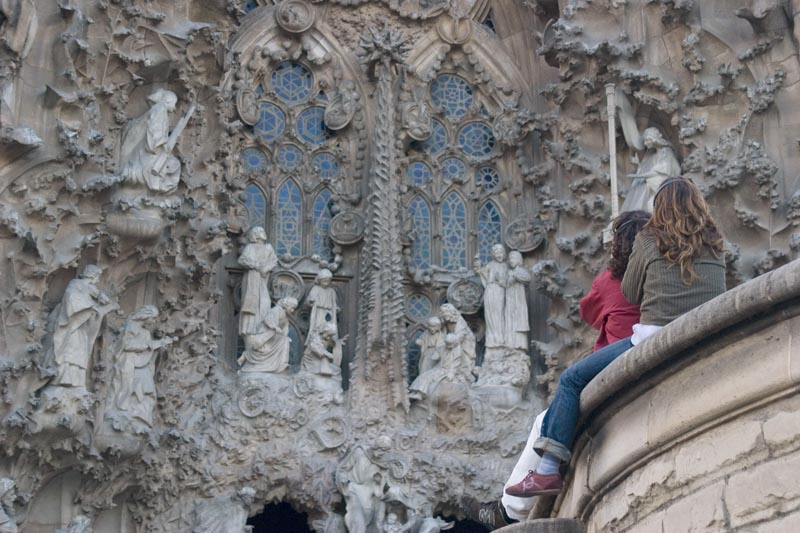
Time to start praying? Barcelona 2005 © Damaso Reyes
“Faced with plunging orders, merchants across this recession-wracked country are starting to do something that many of them have never done: cut retail prices.
“Prices dipped everywhere, from restaurants and fashion retailers to pharmacies and supermarkets in March. Hoping to increase sales, Fernando Maestre reduced prices by a third on the video intercoms his company makes for homes and apartment buildings. But that has not helped, so, along with many other Spanish employers, he is continuing to fire workers.
“The nation’s jobless rate, already a painful 15.5 percent, could soon reach 20 percent, a troubling number for a major industrialized country.”
As we discussed earlier in the week a European problem needs a European solution. Otherwise the weaker nations of the E.U., like Spain, will start to bring down the larger, but increasingly fragile economies of nations like Germany and France. Without strong and decisive leadership European citizens and consumers will increasingly put less faith in their governments and economy, exacerbating the problem. Of course those who will suffer most are those at the bottom of the pyramid: small business owners and low income households. Let’s hope that the magnitude and seriousness of the present situation motivates European leaders towards action.
Thursday, April 30, 2009, 09:53 - Commentary, Photo of the Day
So how will Europe deal with the economic crisis? This seems to be our theme of the week here at The Europeans and it is an important topic indeed. Recently Der Spiegel interviewed the Chancellor of Austria who had some interesting things to say.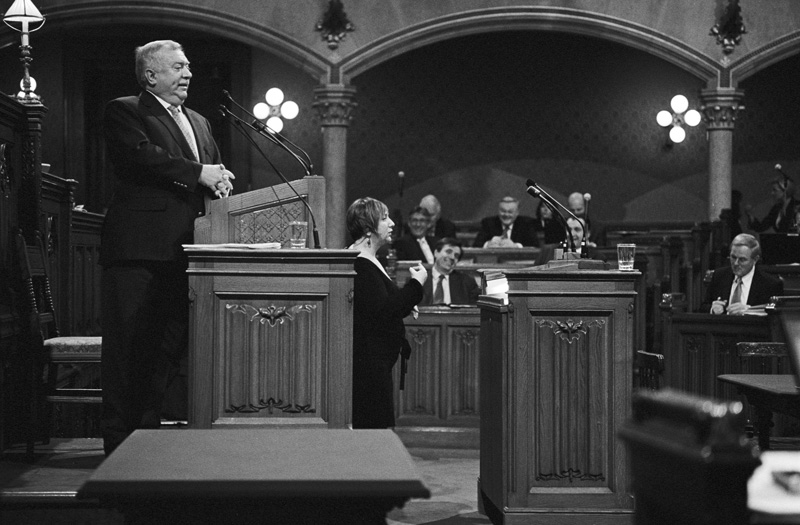
Next Question… Vienna 2008 © Damaso Reyes
SPIEGEL: Mr. Chancellor, you don't seem to be able to please anyone at the moment. Some mock you as the cuddly chancellor of a Grand Coalition in a "land of smiles," while others refer to Austria as a "land of the wavering." What is going wrong?
Faymann: In this crisis, it is important that we mobilize our strengths primarily through cooperation and not by distinguishing ourselves at the expense of others. Of course, we have to know where we want to go -- how not to lose sight of social security and justice, and how to address unemployment with training guarantees or economic stimulus packages. Under these circumstances, teamwork is always better than confrontation, of the sort I experienced in the previous government.
You really should take a few minutes and read the whole article if you have the time. Faymann, in no uncertain terms, says that the solution to the problem must be European wide and not dealt with on a national basis. Of course Austria is a small nation so it makes sense that they would seek the cooperation of their larger neighbors. Nevertheless it is an important shift in the discourse about how Europe, the E.U. and its member states should deal with the challenges that it faces. I sincerely hope that what comes out of this crisis is greater cooperation and a strengthening of a sense of common solutions to common problems.
Tuesday, April 28, 2009, 09:39 - Commentary, Photo of the Day
The more economic news we hear from Europe, the more it seems like the party is indeed over. Of course rising unemployment rates in places like Spain don’t just affect citizens but also the thousands of immigrants who have come to Western Europe seeking a better life as we learn in this article.“Six years after the Spanish construction boom lured him here from his native Romania, Constantin Marius Mituletu is going home, another victim of the bust that is reversing the human tide that has transformed Europe in the past decade.
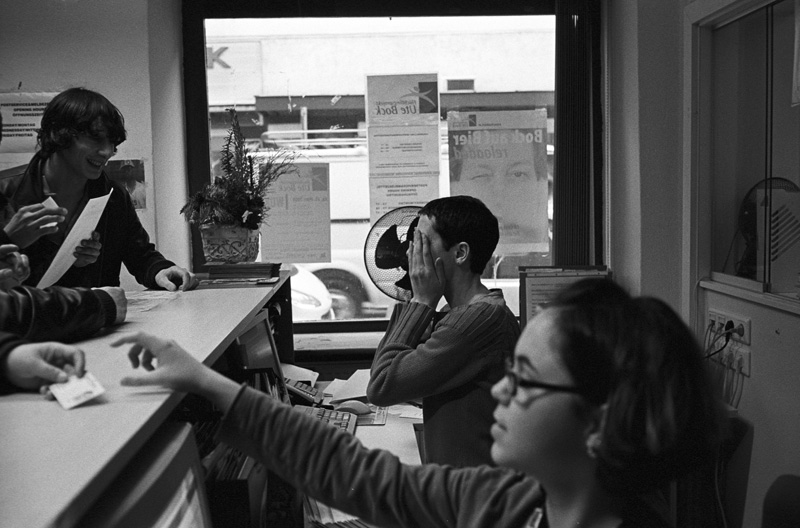
The best is yet to come. Vienna 2008 © Damaso Reyes
“Everyone says in Romania there’s no work,” Mr. Mituletu, 30, said with a touch of bravado as he lifted his mirrored Ray-Bans onto his forehead. “If there are 26 million people there, they have to do something. I want to see for myself.”
“Mr. Mituletu, who is planning to return to Romania next month, is one of millions of immigrants from Eastern Europe, Latin America and Africa who have flocked to fast-growing places like Spain, Ireland and Britain in the past decade, drawn by low unemployment and liberal immigration policies."
How will these large scale economic forces impact the lives of ordinary people? What will happen when the waves of immigrants who left Eastern Europe return? In many ways the European Union is a sociological experiment writ large. Moving around hundreds of thousands, if not millions of people from different cultures is going to create conflict as well as change. How the E.U. and its member states deal with this economic crisis, if they deal with it at all, may determine the future of the Union for years, if not decades to come.
Will the center hold?
Monday, April 27, 2009, 09:28 - Commentary, Photo of the Day
I really, really want to go to Iceland this summer so if anyone wants to help subsidize the trip just let me know. I have become a little fascinated by this tiny island nation since their banking system, and just about the rest of their economy collapsed last year. There is a lot going on there are we learn from this article in the New York Times.
Let’s clean up this little mess we have here. Cologne 2007 © Damaso Reyes
“Buoyed by an election victory that gave a strong popular mandate to her three-month-old caretaker government, Iceland’s prime minister, Johanna Sigurdardottir, told cheering supporters early Sunday that she would move to protect the country’s battered economy by applying for membership in the European Union as soon as possible.”
Now as you recall the whole point of this project is to document how Europe is changing as the E.U. expands. Well it seems like the global financial crisis is now causing the E.U. to expand! Of course if I was already part of the E.U. I would ask “What’s in it for me?” After all, E.U. members tend to bail each other out and another hungry mouth at the table is the last thing the E.U. needs. But if the Union can be seen as a refuge in the storm and help pull Iceland away from the brink then I believe it will do wonders for the Union’s reputation, among other things…
Wednesday, April 22, 2009, 10:59 - Commentary, Photo of the Day
European Union elections are notorious for their low turnout unlike local and national elections in most nations. Not all European leaders are asleep at the switch, even if their methods for increasing turnout is a bit dubious. We learn more from thelocal.de.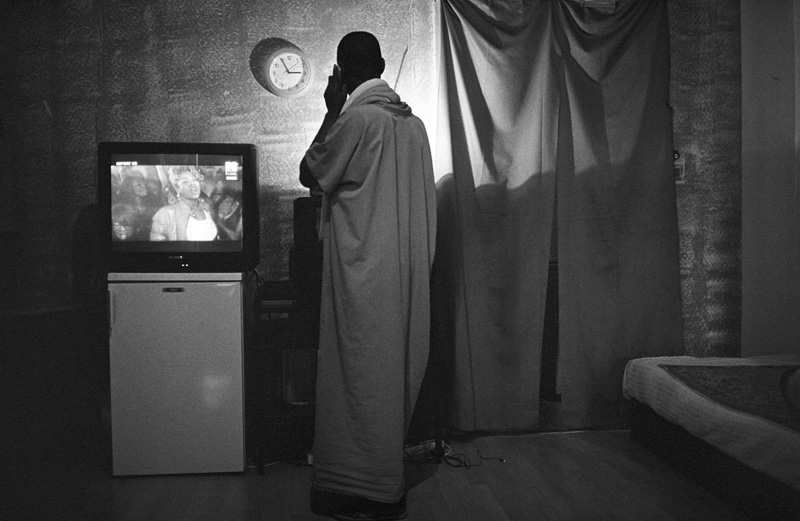
Calling all voters. Vienna 2008 © Damaso Reyes
“With voter turnout expected to be low for the upcoming June European parliamentary elections, North Rhine-Westphalia’s government is giving out a free ring tone for cell phones to encourage young voters to take part.
"The ring tone is a pop version of Beethoven’s “Ode to Joy,” which serves as the European Union’s anthem. Calling it “a catchy tune,” Andreas Krautscheid, NRW’s minister for European affairs, had the ring tone specially composed in order to make younger voters aware of the European elections.
“We want to speak to young people’s preferences and habits and to enable a playful entry to Europe with the cell phone ring tone,” Krautscheid said Sunday.”
Well you have to give him credit for trying, something too many E.U. leaders are not willing to do. I don’t know how much of a difference this plan will really make but at least European leaders are beginning to see the importance of engagement as well as the need to think outside the box…
Monday, April 20, 2009, 10:45 - Personal, Commentary
Last week I let the 4th anniversary of The Europeans pass without so much as a note. Personally I am not much of a birthday or anniversary type of person but it is important to recognize the passage of time. It is also a useful opportunity to think about where we’ve been and where we are going.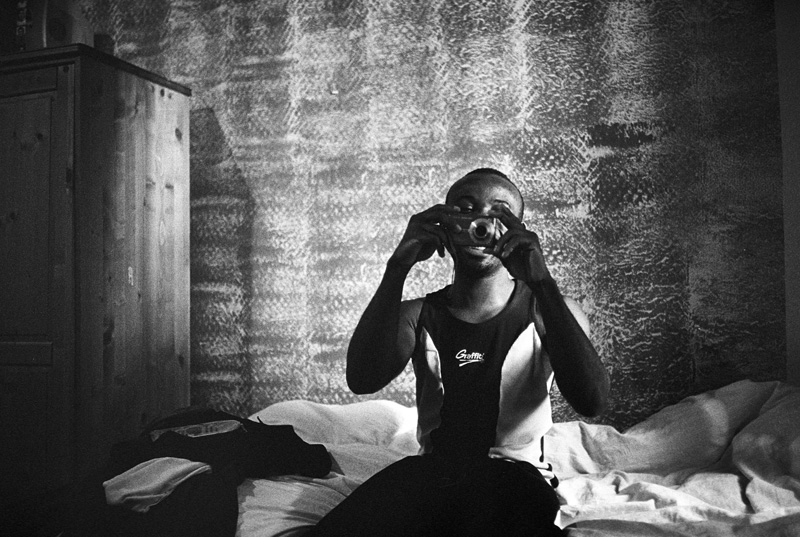
One photograph at a time. Vienna 2008 © Damaso Reyes
As I’ve said any number of times, when I first boarded that plane at JFK international Airport in New York I had no idea of what kind of images I would be taking. All I knew was that something was happening in Europe and I wanted to try to capture it. Back then it was a tall order and it still very much is. This project has challenged the way I see the world as well as the way in which I document it.
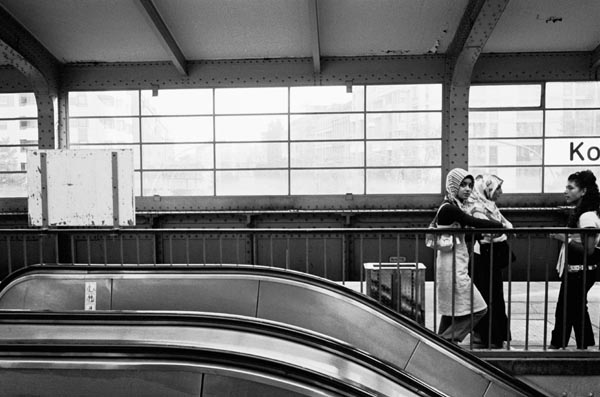
Waiting. Berlin 2006 © Damaso Reyes
The Europeans began without a clear plan and in many ways it is still quite open, something which I feel is an asset. Many of the images I have taken have been happy accidents, the kind that could never be planned. The more I work on the project the more I feel that the changes which are happening in Europe are so subtle that they deserve to be found not by research or planning but by organically experiencing life.
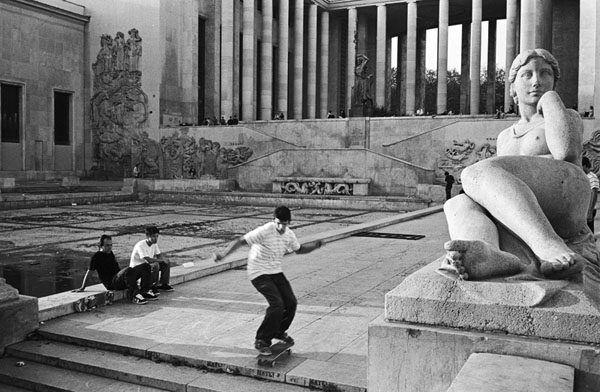
The beauty of Art. Paris 2007 © Damaso Reyes
Sometimes I feel that people expect too much form these images. I have always said that this project is not an academic exploration of history. Personally I hope these images raise far more questions than they answer since the real change that is happening in Europe is not one of economics or politics but a change in mindset and self perception. As an artist and documentarian I try to hold up the mirror as well as draw back the curtain in front of the window. My work is to simply begin a conversation or at least to make it more interesting.

Going home. Kosovo 2005 © Damaso Reyes
And where will the future take us? Of course I don’t have those kinds of answers but I will say that I hope to continue the work that I have begun and delve even more deeply in the waters in which I swim. I can begin to see the light at the end of the tunnel but that light is still so very far away…
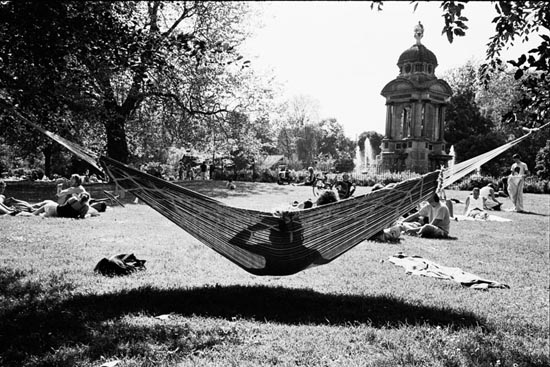
Utopia Planitia. Amsterdam 2005 © Damaso Reyes
Thursday, April 16, 2009, 11:34 - Commentary, Photo of the Day
When I was living in Germany in 2007 I got to visit the quaint town of Pforzeim a few times. Well as we noted yesterday the economic crisis seems to be invading every part of Europe including the places thought to be untouchable, as we read in an article from the New York Times.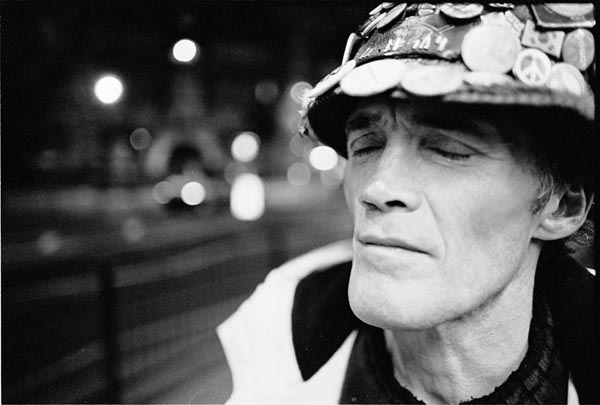
The hard times are here to stay. London 2005 © Damaso Reyes
“This town on the northern edge of the Black Forest traces its heritage as a jewelry center to 1767, when its overlord founded a factory for watches and jewelry at the local orphanage. In recent decades, as the production of lower-end necklaces, rings and bracelets migrated to cheaper labor markets in Asia, the highly trained metal workers here turned to making precision parts for the automobile industry.
“But the combination of luxury goods and automobile parts proved a poor one in this economic downturn, leaving the town of around 120,000 exposed to the clampdown on spending by consumers, particularly in the United States. Pforzheim’s experience is one small part of the losses inflicted by the broader plunge in exported goods around the country.”
Economic disruptions have a profound way of changing not only the way we see the world but the very image we have of ourselves. I think this will be the case for many places in Europe, especially the ones that have grown comfortable in their prosperity. Sometimes heritage is not enough. Sometimes we have to find a way to remake ourselves even as we try to hold onto those qualities that we feel define ourselves. But we can never make the mistake of believe that our history is who we are…
Back Next


 Calendar
Calendar




